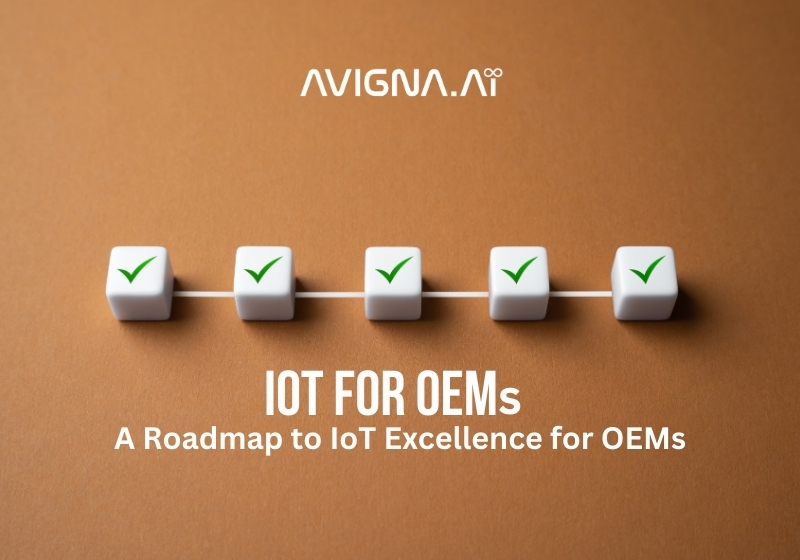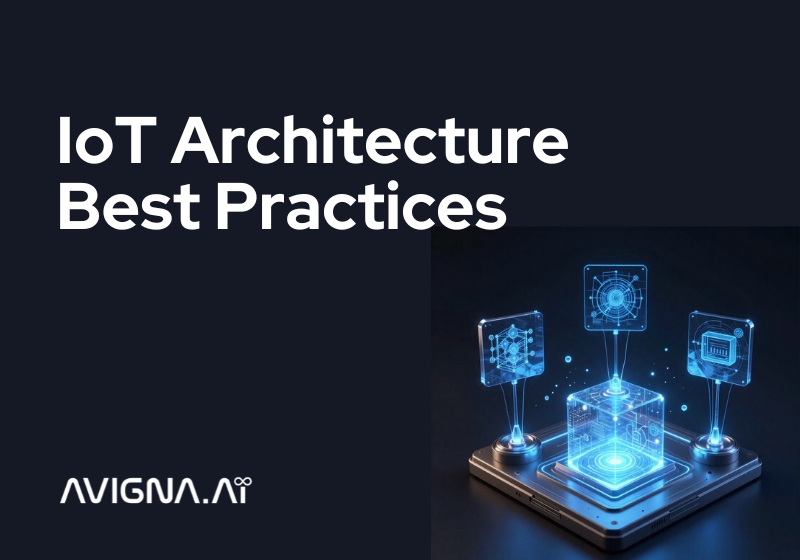IoT For OEM: A Roadmap to IoT Excellence for OEMs
The manufacturing industry is transforming rapidly owing to the extraordinary advancements in IoT. If you are an Original Equipment Manufacturer (OEM), then IoT can help you gain better advantage in the market. You can increase revenues, your services and customer base with IoT for OEMs. This article is a complete guide highlighting how amazing IoT can be for an OEM and how practically you can follow a roadmap to achieving IoT excellence.
Enhancing Product Capabilities with IoT
The most beneficial thing about IoT for OEM companies is that it allows to transform offerings into greater capabilities. It brings IoT-enabled features and connectivity for smart products or equipment. This can then offer an adaptive and highly regarded portfolio of offerings in the market.
Offer Concierge Services
Building your products into on-demand services, plus offering “concierge direct” interfaces, is possible through the IoT. For example, several OEMs now offer services called “subscription-based communication.” It also includes emergency assistance and remote diagnostic systems, through their customer service platforms, such as Ford SYNC, OnStar, Mercedes mbrace, etc.
Facilitate Over-the-Air (OTA) Updates
IoT for OEM forms a connection that allows you to push software updates, security patches, or features to the products. And this is done without human intervention. Its nature of dropping head-on allows the customers to have the latest and greatest features without the burdens of maintenance and downtime.
Optimizing Operations and Efficiency with IoT
In addition to innovation in product functions, IoT for OEM companies can help to refine the internal processes and boosting overall efficiency.
Optimize Manufacturing Processes
IoT for OEMs brings different sensors and monitoring devices. They provide reports of real-time data on everything from equipment performance and energy consumption to workforce productivity and supply chain logistics.
Enhance Supply Chain Management
Much like the above, IoT for OEMs turns inside out regarding supply chain management visibility and control. It’s like continuously following where you supply is lacking and helps to remove burden to manage it manually.
Delivering Exceptional Customer Experiences with IoT
Beyond improving internal operations, IoT empowers OEMs to offer great customer experience to build loyalty, boost engagement, and create new revenue potential.
Offer Personalized Services and Features
For any OEM, IoT can be extensively used for personalizing customer experiences. Customers can easily get information about any new product. They can easily manage and communicate with the service team in case of maintenance or emergencies.
Improve Product Development and Innovation
IoT for OEM companies will also coordinate and hasten the product development and innovation process. It can analyze end-user usage patterns, preferences, and pain points. Then give great direction for future iterations of the product design, features, or functionality.
Designing the OEM IoT Roadmap
Having understood the advantages IoT could offer an OEM, you must know how to implement IoT for OEMs. The following sequence can help in starting your journey:
Assess Your IoT Readiness: Even before going into IoT, have an assessment of current abilities, infrastructure, and resources. Summate one’s strengths, weaknesses, and gaps that need to be worked on. That will give a realistic and strong assessment of IoT strategy.
Define Your IoT Vision and Objectives: You should state IoT goals and how they are aligned with your business strategy. Such goals include enhancing product capabilities, optimizing operations, surpassing customer experiences, or all of these.
Identify High-Impact Use Cases: From this vision and target, identify only those IoT use cases that will bear the heaviest impact. Evaluation may range from IoT ROI and scalability to ensuring it accommodates the peculiarities of your customers and industry.
Build a Robust IoT Infrastructure: Understand all that infrastructure would be necessary to run IoT rather than hardware, software, connectivity, and data management platforms into your setup. Make your systems secure and scalable, fully interconnected with your IT infrastructure.
Develop IoT-Enabled Products and Services: Use your IoT capabilities to provide your products with extra benefits, open new service lines, and explore groundbreaking new business models. Collect customers’ and markets’ voices to re-route development and innovation efforts.
Optimize Operations and Workflows: IoT data and analytics are used to hone the manufacturing process, supply chain management, and maintenance practices. Identify and address inefficiencies and waste and improve overall operational performance.
Enhance Customer Engagement and Experiences: By IoT, create individualized experiences driven by data for your clients toward loyalty and satisfaction. Implement seamless and omnichannel support, offer customized services, and explore new revenue-generating opportunities.
Foster a Culture of IoT Innovation: Involve your employees in thinking big about IoT and what they can accomplish by leveraging different skills and functions for goals where innovation can occur and enabling everyone to getting them to that resource.
Partner with IoT Experts and Ecosystem Leaders: Leverage the expertise and resources of IoT solution-providers, system integrators, and ecosystem partners to accelerate your IoT projects and stay ahead of the curve.
Continuously Monitor, Evaluate, and Optimize: Conduct regular performance and business impact evaluation of your IoT initiative with necessary changes. As this is done, take account of continuous feedback and data analysis into things that ought to be changed so as to sustain an active IoT strategy performance with your business specifications.
Conclusion
IoT offers a vast opportunity for OEMs to innovate and improve their products, optimize operations, and maximize customer experiences. Following this roadmap described in this article will allow your organization to align toward IoT excellence and position it for success in the digital future.
Embrace the power of IoT for OEM and unlock a world of possibilities for your business with us. Book a free consultation. Stay connected on LinkedIn.





